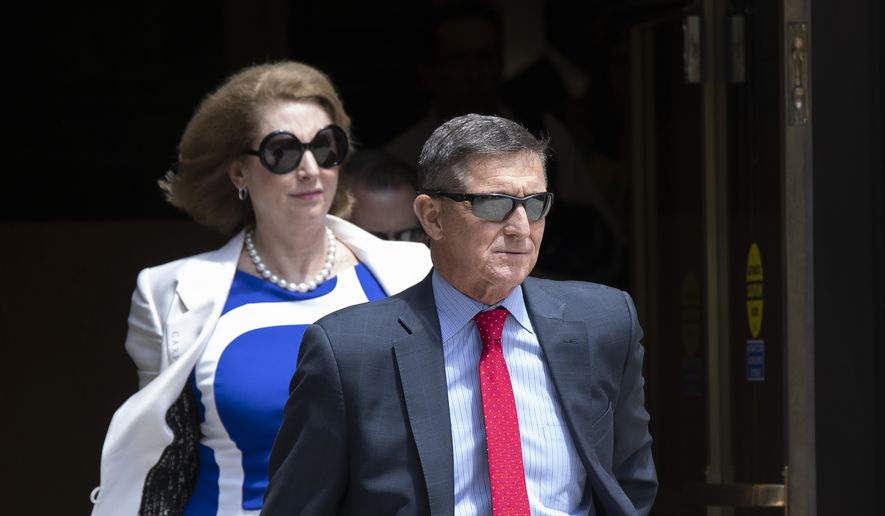Sidney Powell, the lawyer for FBI perjury-trap target Michael Flynn, used to think she was on the same side as the judge who now refuses to let FBI misconduct stand in the way of prosecuting her client.
In her 2014 book “Licensed to Lie: Exposing Corruption in the Department of Justice,” she praised U.S. District Judge Emmet G. Sullivan as someone who holds the government accountable for any wrongdoing in prosecutions.
Now she laments Judge Sullivan’s refusal to dismiss the Justice Department’s criminal case against Mr. Flynn, a retired Army lieutenant general who served as President Trump’s first national security adviser.
Ms. Powell calls the judge’s actions a “huge personal disappointment.”
She said Judge Sullivan previously had valued “Brady material” — exculpatory evidence prosecutors must turn over to the defense, such as the evidence of an FBI setup of Mr. Flynn that prosecutors concealed.
“I always felt like he was the best champion on that,” Ms. Powell said of Judge Sullivan’s record on protecting defendants’ rights.
In the Flynn case, Judge Sullivan pressed to proceed with the prosecution after the Justice Department asked to drop it over alleged prosecutorial misconduct.
On Tuesday, Judge Sullivan’s bid to continue the case goes before a full panel of the U.S. Court of Appeals for the District of Columbia Circuit.
The exculpatory evidence — FBI notes revealing misconduct by Obama-era officials in surveillance of Mr. Trump’s campaign staff and associates — is the crux of the Trump Justice Department’s decision to drop the charges against Mr. Flynn.
“The government made it all up. They made up the basis to surveil [Mr. Flynn] to begin with — I think we are going to learn the surveillance went back to 2014,” said Ms. Powell.
She sat down recently with Sen. Rand Paul, Kentucky Republican, for a public discussion about alleged wrongdoing at the Justice Department and the FBI during the Obama administration.
Ms. Powell said the Obama administration was spying on Mr. Flynn and three other Trump officials only because they had Russian contacts, though Mr. Flynn was just doing his job as part of the transition team when he had phone conversations with then-Russian Ambassador to the U.S. Sergey Kislyak.
It was his phone call during the transition, when he was acting as an incoming national security adviser, that the feds said Mr. Flynn lied about his contacts with Russians.
Ms. Powell dismisses the allegation, saying there is no recording from the FBI of its conversation with Mr. Flynn and he was forthcoming with agents.
“There was absolutely nothing wrong with those phone calls even [former FBI Director James B. Comey] admitted they were legit,” she said. “Everything that has come out has been exculpatory of General Flynn.”
Mr. Flynn pleaded initially guilty during special counsel Robert Mueller’s probe into the Trump campaign and alleged conspiracy with Russian officials to influence the 2016 election, but Mr. Flynn later withdrew his plea after alleging government misconduct, saying the federal agents ambushed him during their interview.
Attorney General William Barr also moved to drop charges in May after his department reviewed the case against Mr. Flynn, saying the agents’ questioning of the former national security adviser was unjustified.
But Judge Sullivan, in an unusual move, has not permitted the Justice Department to drop the charges and instead has gone to court to prolong the prosecution of Mr. Flynn.
A three-judge panel from the U.S. Court of Appeals sided with Mr. Flynn earlier this summer, saying the executive branch must have authority over who it chooses to prosecute, suggesting that Judge Sullivan overstepped his role.
But the judge appealed, and the full appellate court will consider the matter Tuesday. The hearing will be before 10 of the 11 judges on the circuit court.
Judge Gregory Katsas, whom Mr. Trump appointed in 2017, recused himself because he previously had worked in the White House counsel’s office and helped prepare its response to Mr. Mueller’s probe.
Of the remaining judges, seven were appointed by Democratic presidents, and the remaining three are Republican appointments.
Among the notable judges on the panel are Judge Merrick Garland, a Clinton appointee whom Republicans blocked from having a hearing to be named to the Supreme Court, and Judge Neomi Rao, who was appointed last year by Mr. Trump.
• Jeff Mordock can be reached at jmordock@washingtontimes.com.
• Alex Swoyer can be reached at aswoyer@washingtontimes.com.




Please read our comment policy before commenting.